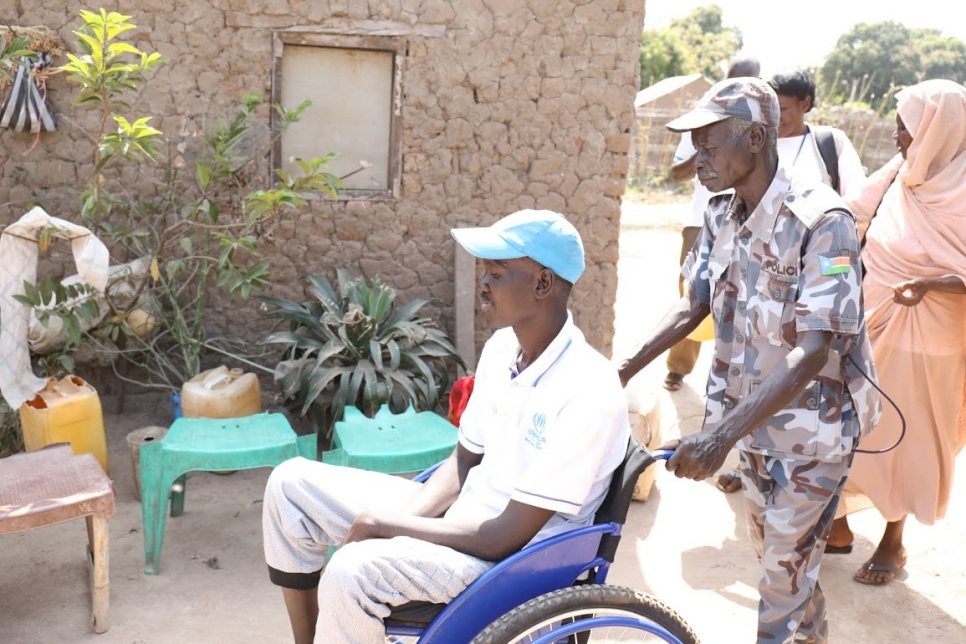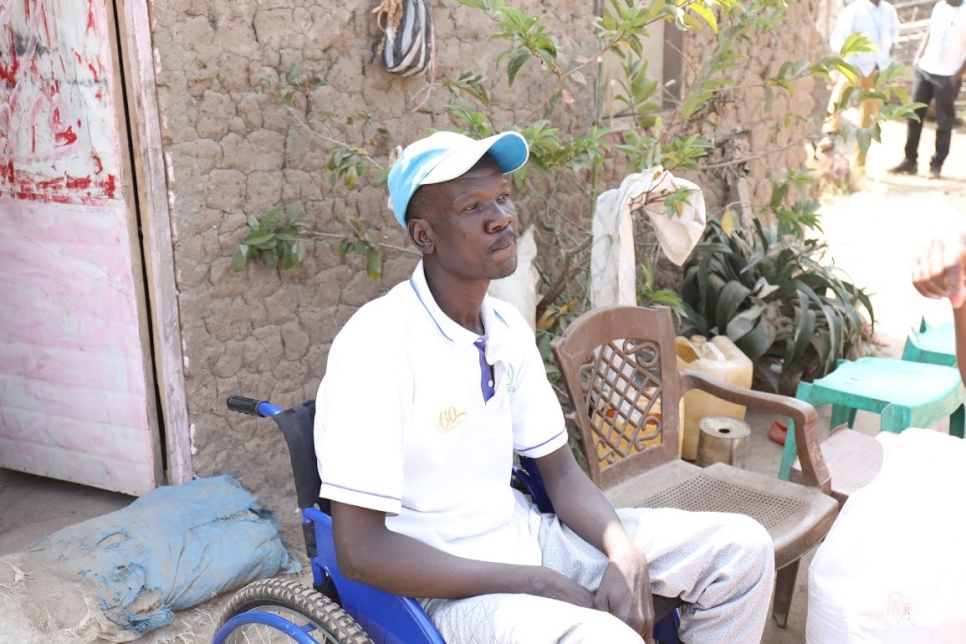Displaced for decades, disabled South Sudanese man finally reunites with family
Alone for thirty years, Zaki finally returns home to his loved ones – most of whom believed him to be dead
Zaki, 43, embraces his father who he has not seen since he was a teenager.
© UNHCR/Emil Sahakyan
The excitement on his face is evident even as Zaki, 43, nervously lights up a cigarette to calm himself. After 30 years of being separated from his family and living in displacement, he is finally about to be reunited with his family in Wau town in South Sudan’s Western Bahr-el-Ghazal state.
“I am 43 but I feel like a 90-year-old man, because I feel like I have experienced everything I can possible experience in life,” Zaki confesses as he waits to meet his father and aunt.
His journey to find his relatives amidst South Sudan’s conflict has been marred by bad luck and tragic events. At only 12, he left for Sudan to seek employment and a better life. When South Sudan gained independence in 2011, he returned home but was forced to flee when conflict erupted just two years later. His life was drastically altered as his family fled in different directions.
“There was not enough food to eat and I was abandoned by everyone because of my disability.”
Separated from his family, Zaki, who by then was disabled due to rheumatism, witnessed various atrocities perpetrated by armed groups. He constantly lived in fear and hiding and often starved.
“There was not enough food to eat and I was abandoned by everyone because of my disability,” he says. “Even my neighbours, who like me were struggling to survive, couldn’t care for me – I was a burden they could not afford.”
An old friend who worked as a government official found him seated helplessly in his house and took him to a UN site for displaced people (POC site) in Melut town. Here, Zika and over 500 other internally displaced people found refuge albeit in extremely tough conditions. The site was overcrowded, with crumbling shelters and insufficient water and sanitation facilities.
“I used to move around by dragging myself with my hands and legs,” he says, as he reflects on the hardships he endured to access certain facilities in the site. He acknowledges that most people were kind enough to help him access basic services like toilets and bathrooms.
As conditions in the POC site worsened, UNHCR, the UN Refugee Agency and other aid agencies revived efforts to find solutions for the people living there. In December 2017, over 700 displaced people were assisted to return home or to places of their choice, resulting in the site’s closure. However, Zaki’s case was special as more effort was required to trace his family.
“We sent a team to Melut for almost a month and a half to help trace Zaki’s family and coordinate these efforts with our field office in Wau,” explains Mary Donya, UNHCR’s Community-Based Protection official.
Their efforts bore fruit - an aunt of Zaki's was traced in Wau town. Unfortunately, she was not willing to take him in.
Zaki remained stoic despite the unexpected turn of events. He was transferred to another site where shortly upon his arrival, people who understood his local dialect, a language that he had not spoken for almost 30 years, started to recognize him.
“Your father is alive and your other aunt is also here.”
One such person turned out to be his brother-in-law.
“I know you! You are Zaki!” exclaimed the middle-aged man when he saw him. He had incredible news for him. “Your father is alive and your other aunt is also here.”
Zaki was surrounded by more relatives and childhood friends, each recalling something about him from the past.
“He was a good football player. I used to watch him play back in the day and wanted to be like him,” said Murad, 32, who works for a local NGO. He did not expect Zaki to be alive.
When UNHCR staff finally bring Zaki’s father and aunt to him, the scene that unfolds is extremely emotional. All present at the venue burst into tears as Zaki’s father embraces his long lost son.
“I thought my son was dead! I last saw him when he was just a teenager,” says Zaki’s father Sebit, tears running down his cheeks. The 64-year-old policeman holds his son closely as the aunt pats him gently on the shoulder. “Don’t cry my son, you are home now and we will not let you go anywhere,” she says soothingly.
“I still can’t believe this is happening to me after 30 years.”
Reunited and back home, Zaki is able to look to a brighter future and UNHCR is offering him vital psychological support.
“I had forgotten what a family’s care and love feels like,” he says. “I still can’t believe this is happening to me after 30 years.”
Although hundreds have been reunited with their families, there are still many more displaced people waiting to return home and to safe areas. Almost two million people displaced in South Sudan, including over 200,000 living in POC sites are desperately waiting to return home.
Zaki’s story has a happy ending and although it will take him time to adjust and get back to a normal life, he will eventually reintegrate into his family and the wider community.
“It is an important protection achievement to reunite families like these.”
“It is an important protection achievement to reunite families like these,” explains Johann Siffointe, UNHCR’s Representative in South Sudan. “Working closely with communities and our partners helps find solutions to protracted displacement, which is in the best interest of the internally displaced.”
Such achievements are highly rewarding and for Zaki, the most important outcome is that he is finally home with his family.




